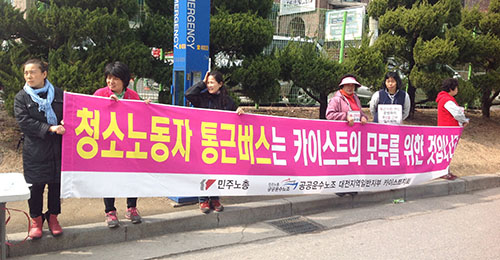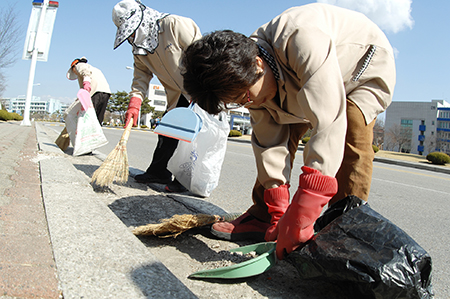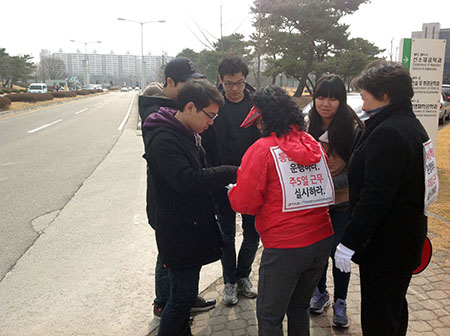The Issues
Several issues concerning the non-regular cleaning staff have been laid out and brought into the spotlight by the KAIST Cleaners Union. This is a response to the discrepancies brought along by the recent change of the services company responsible for employing the staff. Some of the issues that have been highlighted include: problematic clauses in the renewed contract, lack of transportation assistance, disagreeable work hours, and considerably low wages. A portion of the issues pointed out is already being resolved between the company and the workers, but some of the elements remain as debate.

With the change in the services company responsible for the employment, the contracts for the cleaning staff were renewed and altered. Some of the problematic clauses include: a three-month trial period for the cleaners, the need to follow the company's orders unconditionally, and the possibility of contract termination in the event that the cleaners are no longer required by the company. The trial period clause was tackled, as it seemed unnecessary for the current cleaning staff, most having worked at KAIST for a long period of time. Furthermore, the latter two clauses were also challenged because they were acting as indefinite shackles for the non-regular workers.
The next issue the Cleaners Union proposed was the lack of transportation assistance for the cleaners. Some of the workers live far away from KAIST, such as Gyeryong-si, so they have no choice but to use their own means of transportation in order to get to work on time. Therefore, the lack of effective transportation assistance for some of the workers was brought up onto the discussion table.
One of the major complaints the cleaners have is the work hours. As the cleaners are employed by a company outside KAIST, it is difficult for the cleaners to receive equal treatment as those received by the regular KAIST faculties. Unlike the other faculty members, the cleaners must work from 8 a.m. to 5 p.m., six days a week. During the day, they are given two hours of resting time for lunch. The catch is that the period serves as more of a restriction than an opportunity for leisurely lunch. The cleaners have proposed that the lunch hours be reduced by one hour, in exchange for ending work one hour early. In addition, they requested for the work hours during the weekdays to be increased, so that they could have the weekends free. However, both of these petitions were declined, so that the actual time required to stay present at work would be maximized.

Another major complaint is concerning the wages. Excluding the 100,000 Korean Won support fee for transportation and food, the total wage for the cleaners is 1,020,000 Korean Won. In comparison to the national minimum wage of 1,016,000 Korean Won, it is only a mere 4,000 Korean Won difference. However, from the viewpoint of the workers as the mean cost of a lunch meal nowadays is 5,000 Korean Won, both the support fees and the wages are significantly lacking. To emphasize the point about the lack of wages, the members of the Cleaners Union have pointed out that, in comparison to Chungnam University and KISTI, their payment is far below the margin.
To take action, the KAIST Cleaners Union has voiced its opinions through the Workers Union last August. In addition, the cleaning staff had made several protests early this year in order to spread the awareness to the KAIST students. So far, some issues have been resolved. Several of the problematic clauses have been removed or altered. Also, the problem of transportation has been alleviated by some financial support by the services company. However, some conflicts, such as issues concerning the wages and work hours, remain unresolved.
Currently with the Undergraduate Student Council acting as a mediator, both the services company and the Cleaners Union are looking for a synergetic middle ground to conclude this argument. According to the cleaners, all they want is to be treated equally, like the rest of the KAIST faculty.
The School's Perspective
The cleaners in KAIST are divided into two groups: one group is in charge of maintaining the educational and research facilities and has a contract with the Facilities Management Team, while the other group is responsible for the dormitories and has a contract with the Student Welfare Services Team. The recent rallies and protests are related to the cleaners in the educational and research facilities group and the conditions as follows.
The service contract for KAIST cleaners can be classified into six categories: base pay, transportation funding, commuter bus operation, working hours including Saturdays, and annual leave. The contract is renewed annually, with prospective companies bidding for the contract. According to a faculty in the Facilities Management Team, the service contract for 2013 has been changed to give more benefits to the cleaners.
In 2012, the base pay for cleaners was 985,000 Korean Won. In 2013, it has been raised to 1,066,000 Korean Won, an increase of 8.2 percent. The personnel said that compared to other universities in Daejeon, it is above average, and compared to the national average, it is at par. The base pay is calculated from the 2013 minimum wage, which is 4,860 Korean Won per hour.
Regarding the funding for transportation and operation of the commuter bus, not all cleaners were satisfied with the change. In 2012, the cleaners had to pay 50,000 Korean Won regardless of whether they used the commuter bus or not. Some of the cleaners who lived close to KAIST, therefore not requiring the commuter bus, were not satisfied with having to pay the commuter bus fee. In 2013, the policy had been changed to selective deduction. According to the new contract, all the cleaners receive 50,000 Korean Won for transportation funding. However, now cleaners who use the commuter bus service have to pay back the transportation funding while those who do not use the service get to keep the funding. The school will pay an additional 1 million Korean Won to the commuter bus company to compensate for the deficit from the decrease in commuter bus users.
The work hours have changed as well. In 2012, the cleaners had to work 209 hours per month, which is approximately 40 hours per week. This has been changed to 198 hours per month, which is roughly 37.5 hours per week. This is also tied with the working on Saturdays policy. Last year, all the cleaners had to work on Saturdays, which was a waste of labor hours and personal time. This year, cleaners work on Saturdays biweekly. The working on Saturdays policy is related to each building's situations. For example, the Main Library, Sports Complex, Tae Wul Gwan, and other department buildings require cleaning on Saturdays since many students use the building on the weekends, and if left unattended, it will cause garbage and sanitation problems. However, buildings like the Main Administration Building and Auditorium do not require cleaning on Saturdays since few people use the building. Although the union is demanding that the school abolish the working on Saturdays policy, the situations for each building should be considered.
For the annual leave policy, last year the cleaners were granted 15 days' worth of holidays, which included national holidays, but were not compensated for unused days. In 2013, this has been increased to 18 days, excluding national holidays, and cleaners will be given compensation for up to 15 unused annual leave days. Regarding resting places for the cleaners, the Facilities Management Team is not responsible officially. However, individual departments and buildings are creating resting places for the cleaners after renovations.
Their Place at KAIST
Earlier this month, some of us might have seen people gathering around in front of Tae Wul Gwan, petitioning for the amelioration of cleaners' work conditions; othe series of posters explaining the situation about the poor treatment and work environment for the cleaners on campus and asking for the KAIST population's attention and acknowledgment of the issue at hand on the school's online forum ARA; or the little cardboard signs that the cleaning ladies themselves are wearing on their backs, demanding five working days per week.
A closer look at the cleaning workers reveals many serious problems that have somehow been out of sight for the majority: contingent or temporary employment, long working hours but a relatively less rewarding pay, commuting problem, and the labor union.
First of all, the cleaners have temporary working positions and are thereby non-regular workers of KAIST, regardless of having worked for the school for a long time. "As a rightful member of the university society, this type of employment is unfair," reads a poster on ARA. Second of all, the workers are currently asked to work seven hours a day for six days a week. This issue seems to have a very subtle trick to it - the workers are officially entitled to a two-hour lunch break; however, this is only to reduce the number of working hours per day and not really to provide a relaxing meal time. On the contrary, the seemingly luxurious lunch break is rather like a "stand-by" time for most workers. As a result, they are due to work for longer hours than is stated on legal papers and are paid relatively lower than they deserve if the "unofficial" lunch break jobs are taken into account.
Thirdly, the cleaning workers now have an additional problem of having to find their way to the campus on their own because the commuters' bus that had been arranged for the last 20 years had suddenly ceased to operate due to the change of the janitorial service company that had been responsible for the bus arrangement. Now, the workers have no other way to travel to and from their homes, except to collect their own money to book a private bus. The school administration is allegedly leaving the responsibility to take care of their transportation to the janitorial service company called STL.
What can be done, then? Should we leave the workers to figure out their own solution and push them to the brink of a strike? Is there any means of communication within the grasp of the workers, the student population, and the university's administration?
Even though it is easy, at first, to sympathize with the cleaning workers, there does not seem to be any prevailing popular opinion among the students. In fact, some users on ARA present very distinct perspectives on the situation in question.

In response to a suggestion that the Undergraduate Student Council must intervene, another user strongly opposed, saying that the Student Council should concern itself only with issues directly affecting the students' interests. This person's stance was that the improvement of working conditions of the employees will not necessarily favor students' interests and that the Council does not exist to do the "good" or the "right" thing, but it stands to represent the wants of the undergraduates. On the other hand, another view was presented - this time a pro-interventionist one: "improved treatment and work environment for the workers are essentially the same as providing better homes for KAIST members, especially after having seen how the students are ignorant about cleaning the place themselves." The comment with the most number of positive feedbacks reads, "I do hope that the workers get a deserving pay for their commitment to the public sanity and general cleanliness of the campus." On March 20, the Undergraduate Student Council addressed this issue by saying that it is about time that people face this problem point-blank and begin treating the workers more respectfully.
Interview with the Representative
Recently, the cleaners have found their voice. They were seen everywhere around the school for the last month or two wearing signs with bold red letters stating, "Provide transportation vehicles. Enforce the five workdays per week regulation." In addition to these more passive protests, the cleaners have also gone around school trying to publicize the issue by holding petitions and reaching out to trade unions for help. To learn more about the history and investigate the exact issue behind the protests, The KAIST Herald interviewed Kyung Ho Kim, manager in the Korean Public & Social Services and Transportation Workers' Union of the Daejeon region.
Will you please introduce yourself?
My name is Kyung Ho Kim, manager of the Daejeon branch of Korean Public & Social Services and Transportation Workers' Union under the Korean Confederation of Trade Unions.
We noticed that the cleaners have been forming petitions and protesting. What are the issues?
There are two main issues. First is the abrupt discontinuation of the transportation vehicle that had been provided for the employees over the last 20 years. Second, we want to implement the five workdays per week rule.
Our service contract was created 28 years ago in a deposit contract between KAIST and service company Dae-Gun Industries. In October of 2012, trade unions emerged and deemed these deposit contracts against its policies, changing it into a public bidding starting from 2013. To select, KAIST had to formulate what is called a "services design," but in doing so, they neglected to include the previously provided transportation vehicle and instead, designed it perfunctorily such that each worker would receive a transportation fee and meal of 50,000 Korean Won for each. Their inconsiderate design brought upon the abrupt cancellation of the vehicle.
Then, are your protests against the school or the service company?
We believe that the school has to take responsibility because it was out of their negligence to carefully design the service contract that the hardworking employees have to suffer. We brought up a similar issue in 2012. Prior to the trade unions, we had no idea how the contracts worked. We found out that the school grants a bonus every year to reward the employees through the service company. But till then, none of the 100 plus employees ever received it. Turns out, the service company had used this money for the transportation vehicle, which was supposed to be provided for by the company not with the bonus, and took the rest of the money as profit. Despite these kinds of wrongdoings, KAIST has been continuously turning a blind eye. Not checking how the systems are operating and letting this kind of injustice repeat itself again is the fault of the administration.
Are the protests geared towards publicizing the issue? Has there been any progress?
We want to inform the students that such injustice has occurred to hardworking cleaners. By raising awareness, we are trying to improve their current working conditions. We have also held petitions and received close to 2000 signatures from students and faculties. We plan to report the progress to the KAIST administration soon, prove that we have support, and negotiate solutions.
Were there any challenges while fighting for this cause?
Most of the cleaners here did not have prior experience as a member of the labor force and thus, did not know how to make a stance for themselves. Even though each individual felt cheated and frustrated, unifying voices into one and mustering up the courage to actually fight was difficult since the employees were scattered in various buildings while working. Most of them were told that making their voices heard meant getting fired. It took some time, but they overcame that fear and are now making remarkable progress.
Are there any last comments or messages you want to inform our readers of?
I hope the people understand that we do not want the transportation vehicle back just for our convenience. When using the vehicle, the employees usually arrive to school by 7 a.m. Technically, working hours are from 8 a.m., but to have the facilities clean and ready for the students, the cleaners start working from 7 to 7:15 a.m. It is for the sake of all those who use the school facilities. Employees from the service company we may be, but are we not employees of KAIST as well? The cleaners have spent the last 20 years to better the school environment. I hope the students can embrace them as members of the KAIST community. Please turn your attention one more time to this cause. I believe that we can create a synergy with the support and improve for a better KAIST.
Other Cases in Different Universities
Because cleaners are an essential part of the college community, there have been some similar instances in other colleges as that of KAIST at the moment. In 2011, Hongik University fired 170 cleaners all at once because the service company they were working for did not renew the contract with the university. The cleaners took part in a sit-in demonstration for 49 days, demanding continued employment and higher wages.
At the same time, their poor working conditions were iterated. The cleaners had been selling waste paper collected throughout the campus to finance their meals, but the administration prohibited this behavior, saying that the waste paper was school property.
The university sued the labor union for interference with business, and in return, the union filed a suit against the university for violating the minimum wage act. It seemed like they reached an agreement when the university hired the cleaners back with increased wages. After three months, however, the university filed a 280 million Korean Won claim for damages against the workers. The court dismissed the case for lack of evidence, but the administration decided to appeal. The workers had to go back to their tent, forced to continue their demonstration.
Needless to say, there have been more positive examples of a healthy relationship between the university and its cleaners. Hannam University, located in Daejeon, is well known for caring about their cleaners. Every Korean holiday, the administration sends gifts as a way of showing gratitude for the service of the cleaners. This February, President Hyung-tae Kim of Hannam University invited more than 100 cleaners for a snack of rice cakes, encouraging their hard work in a face-to-face encounter. The university has also been providing scholarships to the children of cleaners since 1999. The children get 70 percent of their first semester tuition from the aid. Since its implementation 14 years ago, more than 40 students have benefited from such policy. Likewise, Hannam University's students' association has been conducting a campaign called Green & Clean Campus, where students go on a trip with the cleaners and clean the campus themselves. The university's belief, "They are not cleaners, they are our mothers," is clearly reflective of the respect they have towards the cleaning staff.

Another example from abroad changes the way people think about the cleaners - as not just an employee, but also as a part of the college community. In 2012, 52-year-old janitor Gac Filipaj graduated from Columbia University, one of the elite Ivy League universities in the United States, with a bachelor's degree in classics. An ethnic Albanian, Filipaj moved from Montenegro to New York City 20 years ago, and has been balancing his studies with his full-time job as a "heavy cleaner" from 2:30 p.m. to 11:00 p.m. for 12 years. He got accepted to Columbia after learning English, and his job at the college made him eligible for the institution's tuition-exemption program for staff. He is planning to get a master's degree and even a PhD. in Roman and Greek classics. During an interview after the graduation ceremony, Filipaj showed his affection for the school by saying, "I would like to stay working here, to find a better job here, and to go to school here"

